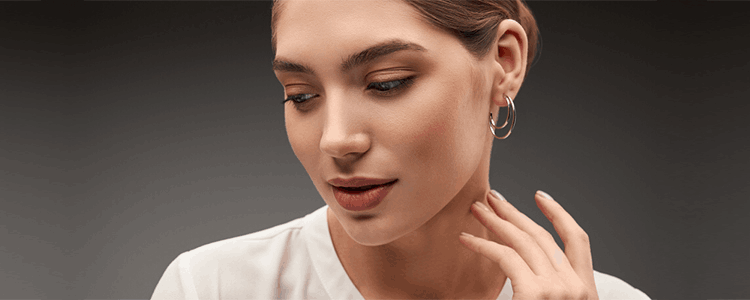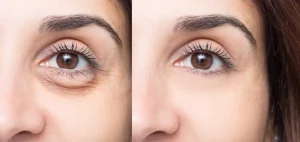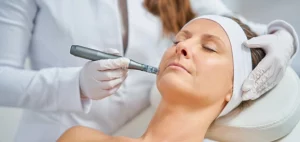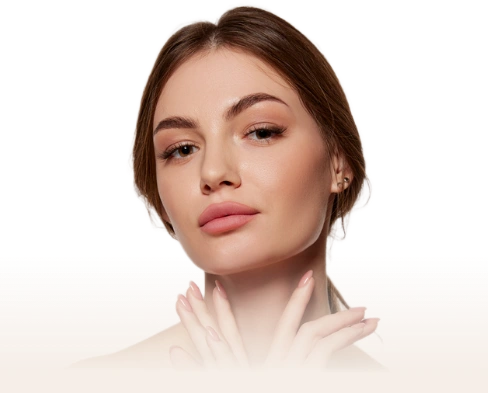Botox is known as the most effective non-invasive wrinkle-erasing treatment in the beauty industry. Not only does it work as a wrinkle eraser but there are many off-label uses of Botox as well, that have gained huge popularity. Masseter muscle Botox is one of them!
Botox is a muscle-relaxing injectable containing neurotoxin that can temporarily freeze or paralyze your muscles. Likewise, the botox injection masseter muscle is injected near your cheekbones that has the capability of changing the shape of your jaw, and the entire face as a consequence.
This process is called Masseter muscle botox – To learn more about the masseter muscle botox treatment along with its benefits, continue reading this blog.
What Is A Masseter Muscle Botox?
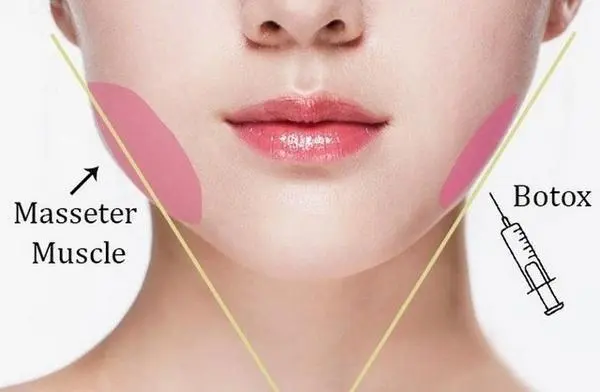
Masseter muscles are located on the side of your face and they connect your cheekbone to your lower jawbone. They are the muscles that help you with chewing and become visible when the lower jaws are clenched.
Botox for masseter muscles is a non-surgical treatment in which the botulinum toxin type A is injected into the overactive jaw muscles. The injection contains a neurotoxin that sends signals to the muscles to block the nerves and relax the cheek and lower jaw muscles. This is also called Jaw botox. This treatment will still let you chew but the movement will be limited. As a result of reduced activity, the jaw shrinks in size.
How Does Masseter Botox Work?
Masseter Botox works by injecting a controlled amount of botulinum toxin into the masseter muscles. The toxin temporarily paralyzes the muscle, which reduces its activity. Over time, this leads to a decrease in muscle size, providing a more defined jawline and relief from conditions like bruxism and TMJ (temporomandibular joint) disorders.
Advanced Botox Injection Techniques
The dose of Botox required for the masseter muscle varies depending on individual needs and muscle size. Typically, each side of the masseter muscle requires about 20-30 units of Botox. A thorough consultation with a qualified practitioner is essential to determine the appropriate dosage for optimal results.
What’s The Procedure for Getting Masseter Botox?
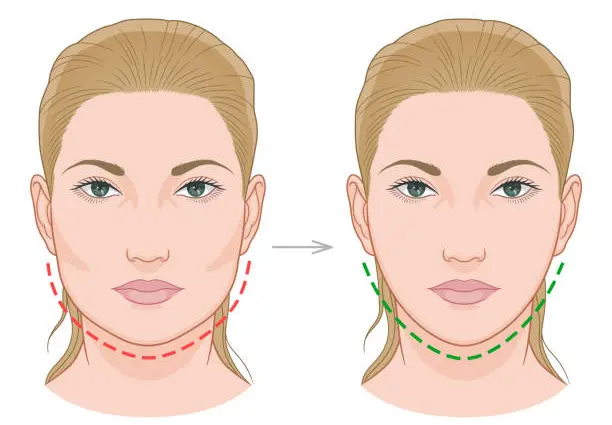
Before the Procedure
Before receiving masseter Botox, comprehensive consultation with a qualified practitioner is necessary. During this consultation, the practitioner will assess your jawline, discuss your goals, and determine the appropriate dose and injection sites.
During the Procedure
The procedure itself is relatively quick and involves minimal discomfort. Using a fine needle, the practitioner will inject Botox into specific points of the masseter muscle. The process typically takes about 15-30 minutes.
After the Treatment
After the treatment, you may experience mild swelling or bruising at the injection sites. These side effects usually subside within a few days. It’s important to follow the aftercare instructions provided by your practitioner to ensure the best results.
What Are The Benefits of Getting Masseter Botox?
Masseter muscle botox will provide you with many benefits – some of which are:
Teeth grinding can be reduced
Botox injections can help you in treating bruxism, in which you grind your teeth and it might cause you pain afterward – because botox can relax muscles, it will also weaken the masseter and relax your jaw muscle.
TMD symptoms can be reduced
TMD stands for temporomandibular joint disorder, as this joint is connected to your lower jaw, and skull and helps in chewing. If you are facing an issue in your temporomandibular joint, botox can relax your joint and help to reduce TMJ symptoms.
Bring your face into the shape
In the treatment of masseter muscle botox, your face will get a square shape in which you can flaunt your jawlines, and your face will look slimmer than before.
When botox is being used for this purpose, it is also called jaw reduction or masseter reduction.
What Are The Side Effects of Getting Masseter Botox?
After carrying out the masseter muscle botox, patients usually experience mild swelling, redness, bruising, or pain around the injection site. These side effects might end within a single week. There is very little chance of having severe Botox side effects. They include:
- Swallowing or breathing can become difficult
- Weakness in muscles
- Nausea
- Bleeding
- Your vision can get blurred or doubled
- You can get serious allergic reactions after botox in the masseter muscle
The number of recommended treatments will depend on factors, such as the severity of masseter hypertrophy and the desired level of facial slimming. If you face any of these issues after the treatment, it is strictly instructed to visit your aesthetician who administered your masseter muscle botox treatment.
What Are The Uses of Masseter Botox?
Botox for masseter muscles is used for the following reasons:
- Contours the square jaw to get a prominent jawline
- Involuntary teeth grinding can be managed
- To reduce the pain, jaw tension, and clenching
- Relieves headache
- Helps in creating a balanced face shape
Where To Inject Botox for Masseter?
Botox injections for the masseter muscle are typically administered at specific points along the muscle’s surface. An experienced practitioner will identify these points to ensure even distribution and effective results.
How To Prepare For Masseter Botox?
Proper preparation can enhance the effectiveness of masseter Botox. Here’s how to get ready:
- Avoid blood-thinning medications and supplements before the procedure.
- Refrain from consuming alcohol for 24 hours prior.
- Discuss any medical conditions or medications with your practitioner.
Masseter Botox Gone Wrong
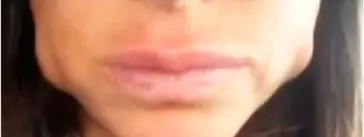
Masseter Botox Before and After
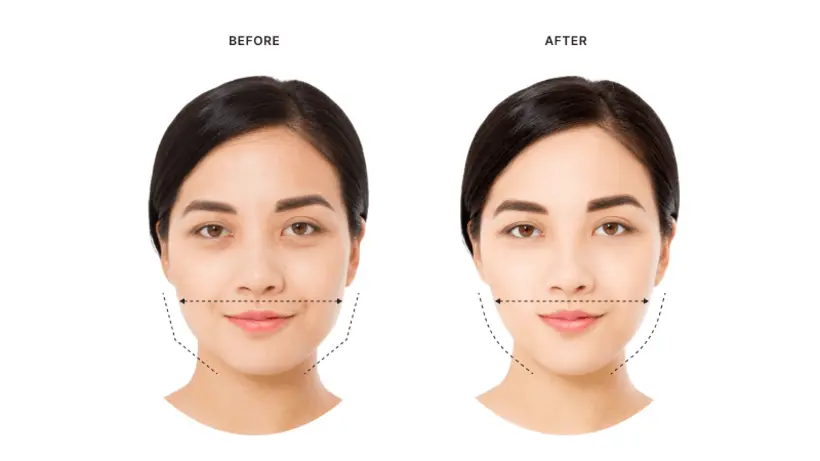
Celebrity Masseter Botox
Makeup artist Lauren Curtis shows off her masseter Botox.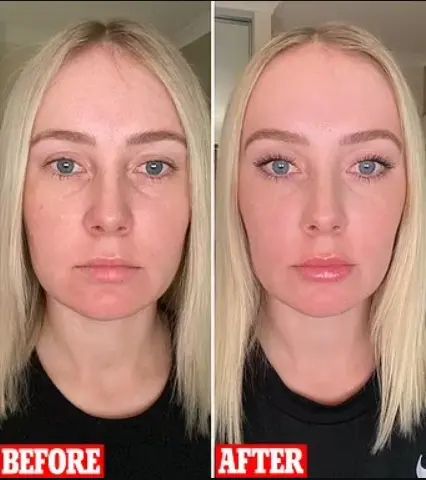
Botox on Jawline Before and After

How Much Does Masseter Botox Cost?
The cost of masseter Botox varies depending on the practitioner’s expertise, location, and the amount of Botox used. On average, the procedure can range from $400 to $600 per session.
How Many Units of Botox For Masseter?
Typically, 20-30 units of Botox are required per side of the masseter muscle. For severe cases of jaw clenching or bruxism, up to 40 units per side may be necessary. The exact dosage should be determined by a qualified practitioner based on individual needs.
How Long Does Masseter Botox Last?
Results from masseter Botox usually become noticeable within 1-2 weeks, with full effects appearing in about 4-6 weeks. The results typically last between 3-6 months, after which repeat treatments may be necessary to maintain the desired effect.
What To Do and Not To Do After Masseter Botox?
What To Do After Masseter Botox | What Not To Do After Masseter Botox |
Apply ice packs to reduce swelling | Do not massage or rub the treated area |
Stay upright for at least 4 hours post-treatment | Avoid intense physical activities for 24 hours |
Follow your practitioner’s aftercare instructions | Refrain from consuming alcohol and blood thinners |
Take over-the-counter pain relief if needed | Avoid lying down or bending over for a few hours post-treatment |
Maintain a normal facial expression | Do not apply pressure to the treated area |
How Do You Know If You Need Botulinum Toxin Treatment?
If you experience jaw tension, teeth grinding, or desire a slimmer jawline, you might benefit from botulinum toxin treatment. A consultation with a specialist can help determine if it’s right for you.
Dysport VS Botox for Masseter
Features | Dysport | Botox |
Spread | Spreads more easily, covering a larger area | More precise and localized |
Onset of results | Typically faster, noticeable in 2-3 days | Results visible in 3-5 days |
Duration of effect | Lasts about 3-4 months | Lasts about 3-6 months |
Units required | Requires more units than Botox | Requires fewer units |
Cost | Generally less expensive per unit | Generally more expensive per unit |
Ideal Use | Larger treatment areas | Smaller, more precise areas |
Protein load | Lower protein load, potentially fewer antibodies | Higher protein load, potentially more antibodies |
Who Should Avoid Botox For Masseter Muscle?
If you are experiencing any of the following conditions, then postponing or avoiding Botox is necessary:
- If you are pregnant or breastfeeding
- If your body faces abnormal blood disorders
- Neuromuscular disorder, in which your nervous system gets weak
- If there is any skin infection or acne in the treatment area, then you must avoid Botox till it cures
- Allergic to botulinum toxin
Conclusion
An unpleasantly wide jawline or pain caused by an overactive masseter may be treated with Botox and to get a successful and safe masseter botox procedure, choosing an experienced aesthetican is very important.
Frequently Asked Questions
How long does Masseter Botox take to work?
Masseter Botox typically begins to show effects within 1 to 2 weeks after the injection. Patients often notice a reduction in muscle activity and relief from symptoms such as jaw pain or teeth grinding during this period. The full slimming effect on the face may take up to 4 to 6 weeks to become noticeable, as the masseter muscles gradually reduce in size and the jawline becomes more contoured.
Does Masseter Botox slim your face?
How painful is the Masseter Botox?
Masseter Botox injections are usually minimally painful, often described as a slight pinch or sting. Numbing cream can be applied to enhance comfort.
Can I exercise after Masseter Botox?
It’s advised to avoid strenuous exercise for 24 hours after masseter Botox to prevent spreading the toxin.
Can I chew after masseter Botox?
You can chew after masseter Botox, but it’s recommended to avoid hard or chewy foods for the first 24 hours.
Can you eat after masseter Botox?
Does masseter Botox cause jowls?
Masseter Botox typically does not cause jowls; in fact, it can help enhance the jawline and reduce the appearance of jowls in some cases.
Is Masseter muscles Botox permanent?
Does Botox injection decrease jaw pain?

About The Author
Dr. Syra Hanif M.D.
Board Certified Primary Care Physician
Dr. Hanif is the Director of Aesthetic Medicine. She is a board-certified physician in Aesthetic Medicine who specializes in using non-surgical alternatives in order to enhance one's appearance through Botox and fillers.
Read More




